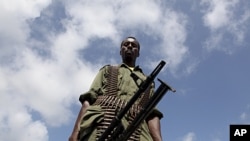Human Rights Watch released a statement Thursday accusing Kenyan security forces of abusing Kenyan Somalis and Somali refugees in northeastern Kenya, particularly in the provincial capital and around the Dadaab refugee camp. A military official, in turn, says that the army has nothing against Somalis and Kenyan-Somalis.
Human Rights Watch East Africa researcher Neela Ghoshal tells VOA she personally witnessed a group of civilians being abused at a Kenyan military camp in the provincial capital of Garissa on Wednesday.
“They were forced to roll around in the mud and to do various gymnastic positions that seemed like they were designed to humiliate them." Ghoshal stated. "I was able to speak to a few of the victims after they were released and it seemed they had just been picked up because they were hanging around near the military camp but not in prohibited areas. They were accused of being al-Shabab, and taken to the camp, and mistreated.”
Ghoshal says this is the latest incident in a pattern of abuse committed against Kenyan Somalis and Somalis by Kenyan police and military in various areas of North Eastern province. Alleged abuses include arbitrary arrests, beatings, rape, and lootings.
Thursday’s statement says the abuses began at around the time the Kenya Defense Forces entered southern Somalia in October with the aim of eliminating the militant Islamist group al-Shabab.
The human rights watchdog cites several serious incidents since then, including a November 24 crackdown in Mandera in which police and soldiers allegedly rounded up hundreds of people suspected of involvement in two grenade attacks and an assault on a military convoy. It alleges that many of the suspects’ limbs were broken during beatings.
The group says in another incident, in the Dadaab refugee camp, Kenyan police allegedly raped at least seven women and beat scores of camp residents following explosions targeting police vehicles.
Ghoshal says she thinks many police and soldiers have a deep bias against ethnic Somalis.
“Essentially, the police and the military both seem to be taking out frustrations in response to attacks against the security forces, not by thoroughly investigating and apprehending the perpetrators who are actually responsible, but by rounding up people in the area and arbitrarily mistreating them,” she said.
The statement says that the military spokesman, Major Emmanuel Chirchir, told Human Rights Watch that the group of civilians the organization witnessed was being questioned because they allegedly tried to build an illegal structure outside the military camp. He told Human Rights Watch that he was unaware of any abuses but would investigate the allegations.
Attempts by VOA to reach Chirchir, as well as Kenyan police spokesman Eric Kiraithe, by telephone, were unsuccessful.
Kenya Defense Forces operations information officer, Colonel Cyrus Oguna, tells VOA he would not comment on the allegations made against Kenyan forces inside the country.
He says it is not true that Kenyan forces are biased against ethnic Somalis, saying that many military personnel are themselves ethnic Somalis. “The Somalis who are Kenyans are Kenyan Somalis by right. They are protected by the constitution of this country, and there is no way Kenya Defense Forces can turn against its own people,” Oguna said.
Oguna says Kenyan troops provide humanitarian assistance to Somalis in Somalia, and work closely with Somali informants, so there is a good relationship between the two.














